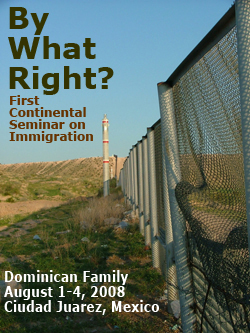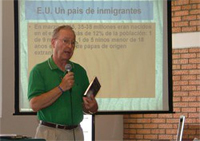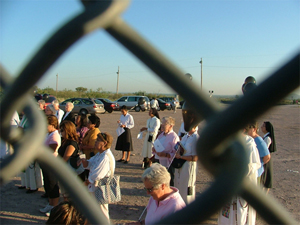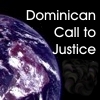Immigration
is Key Issue in Gathering
of Latin American and US Dominicans
CIUDAD JUAREZ, MEXICO – August 25, 2008 – For
the first time, Dominicans from Latin America and the United States
gathered to explore the complexities and layered issues surrounding
immigration at a meeting here August 1-4.
 The
goals of the first continental seminar on immigration were to strengthen
common understanding and build solidarity among Dominicans in North
and South America who are working among or on behalf of immigrants;
to conduct an analysis of the political, economic, social and ecclesial
situation; and develop a strategy for action together. The
goals of the first continental seminar on immigration were to strengthen
common understanding and build solidarity among Dominicans in North
and South America who are working among or on behalf of immigrants;
to conduct an analysis of the political, economic, social and ecclesial
situation; and develop a strategy for action together.
It is impossible to be a Dominican and not be an immigrant,
a person on the move, an itinerant in permanent movement. This sentiment
exemplifies the connection Dominicans made to the plight and problems of migrant
peoples who are caught between the urgent need to provide for their families
and US economic policies that drive them north into an uncertain and dangerous
future.
Organized by the co-promoters of justice and peace in Latin and
North America, the First Continental Seminar, as the meeting was
called, was held at Casa del Migrante, a center for immigrants
who have been deported from the US or who are looking to resettle
in Mexico.
Forty-two Dominican sisters from 16 congregations, 20 friars from
six provinces and six Lay Dominicans, representing 12 countries
met to explore the issues and plan collaborative action. About
30 US Dominicans attended.
Chuck Dahm, North American Co-Promoter of Justice and Peace said,
"The conference was enormously successful in several ways: It
provided us U.S. Dominicans with the inspiring opportunity of getting
to know personally our Dominican Latin American sisters and brothers
working with the immigrant poor. It heightened the urgency for
all of us to work for reform of the unjust immigration system
in the U.S. Finally, it emphasized our need to understand the
global economy and its devastating impoverishment of millions
of families."
 |
Chuck Dahm, OP (St. Albert)
North American CoPromoter of Justice and Peace addresses the
group |
Chuck was one of the organizers, including Dusty Farnan, OP (Adrian)
North American Co-Promoter of Justice and Peace along with Noemi
Zambrano, OP (Cabra) CODALC and Miguel Concha, OP (Mexico) CIDALC.
The program included intense presentations on the economic and
societal causes of migration, the suffering and losses experienced
by people on the move, political realities both in the North and
South and pastoral responses by the Church. The plenary sessions
included moving testimony from migrants who have attempted or who
returned from crossing the US border. One woman, whose husband
died enroute from Honduras to Juarez, hoped to find work and a
new life in the United States. She described a frightening journey
that took two months, sleeping in hidden places during the day
and traveling at night.
Justice Promoter Rose Van Buren, OP (Columbus) said, “All
that I heard only reinforced the image of itinerant Dominicans
who are called to identify with those who have been forced from
their homes by globalization and a world that doesn't want to accept
any limits on its consumerism.”
Language groups worked in small group sessions
to build connections and explore the implications of Dominican
responses to the issue.
Among the many presenters were
Chuck Dahm, OP (St.
Albert) North American Co- Promoter of Justice and Peace, offered
a plenary session on the history and present law on immigration
in the US. Toni Harris, OP (Sinsinawa) International Co-Promoters
of Justice and Peace offfered a comprehensive description of global
phenomenon of human mobility and the Dominican response.
Antonio
Cube, Director of the Justice for Immigrants Campaign of the USCCB,
spoke on the pastoral response of the US Bishops. He
observed that most US Catholics oppose immigration reform because
they are caught in the bind of legalistic thinking. "What
don't you get about being legal?" is a typical response
that the US Bishops are hoping to change.
The participants in the seminar saw
a larger, more Gospel centered pathway.
 |
ABOVE:
Participants listen in plenary sessions on economic, judicial,
social and political aspects of immigration
LEFT: Kathy Nolan, OP (Adrian) and Pat Simpson,
OP (San Rafael) confer during the opening session. |
Although no clear or easy solutions to issues of immigration are
evident, it is clear that the question of immigration legislative
reform in the US will not return to public debate until well after
the presidential election and new Congressional term in January,
2009. Neither
candidate for president of the United States has been willing to
discuss the issue. What do Dominicans do in the mean time?
Frequently, issues of national security, linked to the
terrorism of September 11th have been tied to immigration issues
and the constuction of the $9 billion fence along our
border with Mexico. However, this clouds the issue of who is migrating and
why.
In their concluding
declaration the participants said, "In
the countries of their settlement, migrants also encounter discrimination
and exploitation. While
their labor is more than welcome because of the unjust wages they
are forced to accept, their legal presence and even their human
and civil rights are denied. Since September 11, 2001, legal
initiatives in the United States have increasingly undermined the
security of their labor, curtailed their freedom of movement and
their opportunity to normalize their legal status as well as their
efforts to secure the unity of their families. Moreover,
they are increasingly vilified as threats to national security
and stability and forced to live in fear in the dark recesses of
society." (Read
the full text here)
Experts
agree that US trade policies such as NAFTA (North
American Free Trade Agreement) have helped fuel migration
from Latin America (mostly Mexico) into the United States. Since
1994, NAFTA removed most barriers to trade and investment among
the United States, Canada, and Mexico. In 2005, Congress
voted to extend NAFTA to five Central American countries
through the Central
American Free Trade Agreement (CAFTA).
In a stirring and passionate response to the Mexican special
prosecutor's report on violence against women, Bishop Raul Vera
spoke about the Church's response to violence and declared, "What
does it mean to be Catholic if we do not address social issues?
The Church cannot be satisfied just to pray."
 In
a public witness of solidarity, the group celebrated Eucharist
as the US Mexican border with the assistance of Corpus Christi
Parish near Juarez. Bishop Raul Lopez Vera, OP again preached an
impassioned homily while some participants stood on the US side
of the border fence. Border patrol vehicles watched from
a distance while a helicopter flew over head. In
a public witness of solidarity, the group celebrated Eucharist
as the US Mexican border with the assistance of Corpus Christi
Parish near Juarez. Bishop Raul Lopez Vera, OP again preached an
impassioned homily while some participants stood on the US side
of the border fence. Border patrol vehicles watched from
a distance while a helicopter flew over head.
(see
more photos)
The participants agreed to commit themselves
to work more closely, South and North in making a pastoral
response to the problems of migrant people.
Margaret Mayce, OP (Amityville) newly appointed NGO Representative to the UN
in New York, said, "Our experience together, as brothers and sisters, particularly
as we celebrated Eucharist on the border through a chain-link fence, was a
profound reminder that there are no borders between us - unless we choose to
establish them. I have no doubt that each of us, whether in the North or the
South, will do whatever we can to chip away at the attitudes and fears that
create obstacles to a sharing of our common humanity."
The group called for a change of “attitudes, conceptions,
and approach are needed which involve all of us and not only state
institutions.” The group committed itself to promote
policies that respect human rights and to monitor human rights
violations. In addition, the group called on the Dominican
Family to strengthen its role in bring attention to this problem,
particularly in areas of religious formation and public education
and to work together through our networks to defend the human rights
of migrants. (Read
the full text here)
There is much work to be done politically, economically and socially.
Most significantly for Dominicans the work is pastoral. Our call
is to relieve the suffering of people who come to our borders
seeking a better life in a country traditionally rooted in welcome
and opportunity. Our task is to awaken in those who oppose immigration
reformto a recognition of the basic human right to life, liberty
and the pursuit of happiness for everyone. Those who hold on to
the dream of freedom and opportunity that our country has always
promised cannot be denied the dream that has defined us as Americans.
Anne Lythgoe, OP
DLC Communications Coordinator
|







 In
a public witness of solidarity, the group celebrated Eucharist
as the US Mexican border with the assistance of Corpus Christi
Parish near Juarez. Bishop Raul Lopez Vera, OP again preached an
impassioned homily while some participants stood on the US side
of the border fence. Border patrol vehicles watched from
a distance while a helicopter flew over head.
In
a public witness of solidarity, the group celebrated Eucharist
as the US Mexican border with the assistance of Corpus Christi
Parish near Juarez. Bishop Raul Lopez Vera, OP again preached an
impassioned homily while some participants stood on the US side
of the border fence. Border patrol vehicles watched from
a distance while a helicopter flew over head. 
